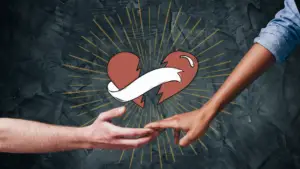Today, we’re talking about how to avoid being a “nice guy”. We’ll also break down what that phrase really means, and how getting away from it will improve your social life tenfold.
The term “Nice Guy Syndrome” is used to describe men who believe they are entitled to women because they’re “nice guys.” Many times, they are subconsciously guilting women through superficial “nice deeds” that are really only motivated by attempts to get a relationship and/or sex.
We’ve all seen the nice guy in action. He’s the guy that constantly praises women or defends them in any discussion. He’s the simp holding the door open and bending over backward to win over hearts.
Now, there’s nothing wrong with being a good person, but nice guys aren’t really trying to be nice. They’re just doing anything they can to please a woman, and it’s over the top. It’s no fun to be around someone that is constantly simping for you.
Let’s go over some common nice guy traits that should always be avoided.
7 Characteristics of Nice Guy Syndrome
1) Overreacting to rejection – One of the hallmarks of a “nice guy” is their inability to consider the actual thoughts and feelings of the women that they’re simping for. They think that they’re entitled to affection because of their “nice” deeds. Kindness isn’t a game, and you shouldn’t be keeping score.
2) Reminding others of his kindness – True kindness comes from the heart. That means you’re doing it for the sake of being kind, and no other reason. By telling people how kind you are, you undermine the authenticity of every kind deed you do.
3) He can’t sympathize with women’s trust issues – Many nice guys tend to overlook the validity of a woman’s feelings. That’s the thing about emotion: There’s no “wrong” or “right” way to feel. People will have preferences in life. They will like you, and they will dislike you. Dating is about accepting that. As the old adage goes, “Some will. Some won’t. So what?”
4) He wants to be rewarded – Behaving kindly doesn’t earn you some kind of “gold star” from women. If anything, you should always be kind, and not “turn off” your kindness if you can’t get anything out of someone. How would you feel if everyone that acted kind to you was just using you, and everyone else was unkind to you?

5) He goes out of his way to help, but expects you to do the same – A lot of nice guys will get angry when their “good deeds” aren’t reciprocated. In fact, some will even try to guilt-trip women who don’t feel the same way about them. This is a huge red flag.
6) He’s self-loathing – Acting like a nice guy is a sure way to become disliked and unpopular. Deep down, a lot of nice guys hold a strong resentment towards women for never accepting their provocations.
7) He requires an unhealthy amount of consistency – In any healthy relationship, there are ups and downs. There are days when one’s partner might be tired, moody, or angry. No one is 100% enthusiastic and energetic all of the time, and many nice guys fail to realize that.
What’s Wrong With Being a “Nice Guy”?
Most men become nice guys because they lack confidence in themselves, making them become needy and emotionally dependent. Let’s break down how nice guys victimize themselves:
First, there’s the “bait”. This is when a nice guy gives a favor quid pro quo. There’s a myriad of ways in which this can be done. It may be a huge gesture (as big as a major purchase or gift) or a bunch of small gestures (like repeated compliments or subtle attitude changes).
Next, the nice guy doesn’t get anything back, and this infuriates him. Even if he is receiving kind treatment in return, he feels like it’s not “even” and that he isn’t getting a fair trade.
Finally, the pent-up frustration and anger explode into a variety of unhealthy habits. Most notably, nice guys take to the internet as self-described “incels” and talk about how much they hate women. In real life, nice guys lash out at women, often leading to tantrums or other angry behavior.

As a result of this, Nice Guys don’t feel in control. They feel they’re doing the “right thing” but that the whole world somehow seems to be abusing them.
What Leads Men To Become “Nice Guys”
You may have noticed that the “nice guy” phenomenon is a relatively new concept, and recent culture seems to have produced nice guys by the bushel. Why is this?
If we turn the clocks back to a fully patriarchal society (most of human history), a stunning observation can be made: “Nice guys” have usually gotten their way, with few exceptions.
From arranged marriages to a lack of any real idea of consent or women’s rights, we can see that the men of the past have been able to be competitive suitors just by being “nice guys” alone.
This is evident all over mass culture. You can probably ask your grandma how she fell in love with your grandpa and she’ll say something like “He just wouldn’t leave me alone!” Every book, movie, or TV show has a romantic plot that involves the protagonist being rejected by the love interest before eventually winning her over in an act of true love.
Now that humanity has caught up to women’s rights, the dating game has shifted. You can’t have a woman just by giving her dad a herd of cows, or by begging her until she accepts. You have to actually earn it.
What is the result of this mass culture that’s far behind 21st-century egalitarian society? A generation of men that are confused, frustrated, and hostile. The nice guy was born.
How To Stop Nice Guy Syndrome
The root of nice guy behavior is an inability to adhere to modern, respectful standards of courtship interaction. So how does one achieve that?
1) Stop chasing validation – In a sexual marketplace fueled by consent and personal opinion, no one is guaranteed anything just because they “acted a certain way.” There will be a lot of women who simply aren’t into you, no matter how hard you try. Use this hyper-social environment to interact with as many fish in the sea as you can, rather than fixating on the same women.
2) Have strong boundaries: Say no – Another great advantage of a consent-based society is the ability for everyone to operate voluntarily. There’s no rule that says women are the only ones allowed to say no! Take advantage of your freedom and only do what’s comfortable for you.
3) Remind yourself that this isn’t a zero-sum game – You don’t have to sacrifice in order to succeed! The happiest relationships involve mutual benefit, where everyone has a good time in a comfortable setting.
“Nice Guy Syndrome” VS Emotionally Sensitivity
Like any other new cultural buzzword, the phrase “nice guy” is bound to be overused. So what’s the difference between a nice guy and genuine, valid frustration?
For the most part, nice guy syndrome comes from putting on a facade, and not being true to one’s self.
Emotional sensitivity is different, and a big part of every healthy relationship. Whereas nice guy syndrome focuses on hiding true emotions under the guides of favors, emotional sensitivity is rooted in honesty and communication.
To practice emotional sensitivity/honesty, be upfront about yourself, and don’t act subversive in any way. Most importantly, think about the other person’s perspective before anything else.
In Conclusion:
In this article, we covered the depths of “nice guy syndrome”, where it comes from, and how to avoid it. Here are some key takeaways:
● Nice guy syndrome is when men perform superficial favors for women, expecting to receive special attention or treatment in the future.
● Nice guy behavior is extremely toxic and is very unsuccessful as a dating strategy.
● The syndrome itself can be traced back to patriarchy ingrained into our society, which is in conflict with ideas of consent and equitable relationships.
● You can avoid nice guy syndrome by identifying it and trying to understand a woman’s perspective as much as possible




